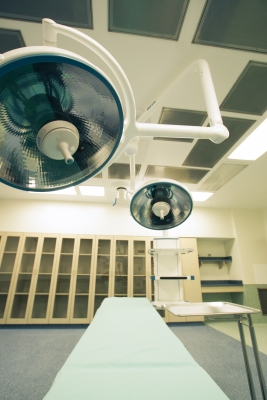The Centers for Medicare & Medicaid Services (CMS), an agency of the U.S. Department of Health and Human Services, published proposed rules this spring that would amend the fire safety standards for hospitals, long-term care facilities, ambulatory surgery centers, hospice inpatient, and many other healthcare facilities that participate in Medicare and Medicaid programs.
CMS proposed adopting the 2012 editions of the Life Safety Code, which includes measures devised by the National Fire Protection Association, and includes the Healthcare Facilities Code. A key change is a requirement that buildings over 75 feet tall have sprinkler systems throughout the structure. Existing buildings would have 12 years to install them.
Automatic sprinkler systems will be required in all habitable areas, closets, roofed porches, balconies, and decks of new residential health care facilities. CMS also strongly encouraged existing facilities to be sprinklered in all habitable areas. Under the new provisions, sprinklers also must be installed in attics of new and existing residential facilities if the attic is used for living purposes, storage, or the housing of fuel-fired equipment. Or, it must have a heat detection system, be of noncombustible construction, or be constructed of fire retardant treated-wood.
Newly-constructed facilities would have to install approved smoke alarms inside every sleeping room, outside every sleeping area, and on all levels within a residential unit. CMS is soliciting public comment regarding whether that requirement should be applied to existing facilities, as well.
(http://www.jdsupra.com/legalnews/new-federal-health-care-facility-regulat-93481/)
Related Stories
| Sep 26, 2013
OSHA encourages comments on respirable crystalline silica rules
The Occupational Safety and Health Administration’s proposed rulemaking for respirable crystalline silica has been published in the Federal Register.
| Sep 26, 2013
EPA’s final rule on updated ASTM standard likely to be withdrawn
The Environmental Protection Agency is expected to withdraw a direct final ruleissued in Augustregarding an ASTM standard for Phase I Environmental Site.
| Sep 26, 2013
A primer on RoofPoint green-rating system for commercial roofs
The RoofPoint green-rating system can be used to construct more energy-efficient and sustainable commercial roofs.
| Sep 26, 2013
ConsensusDocs releases updated federal subcontract to help construction firms perform federal work
The newly revised ConsensusDocs standard subcontract (ConsensusDocs 752 for federal work) will make it easier for general contractors and subcontractors to perform federal work.
| Sep 18, 2013
Proposed Boston casino development approval will depend partly on sustainability
The movement toward green building has been slow to catch on in the casino industry, but that could change with Suffolk Downs, which plans to build a $1 billion casino in Boston.
| Sep 18, 2013
Regulations could ease firefighters’ fear of roof solar panels
The local fire chief says solar panels are partly to blame after a 300,000 sf refrigerated warehouse in Delanco, N.J., burned down.
| Sep 18, 2013
New AISC design guide on structural stainless steel now available
For the first time in the U.S., design professionals now have an authoritative resource on structural stainless steel with AISC Steel Design Guide No. 27, Structural Stainless Steel.
| Sep 18, 2013
DBIA’s ‘Design-Build Done Right’ best practices project seeks industry input
The Design-Build Institute of America (DBIA) is seeking industry input on its project to create a design-build best practices document.
| Sep 11, 2013
USGBC Florida Chapter survey to help contractors adopt sustainable practices
Contractors in Florida could benefit from a data collection project by the state's chapter of the U.S. Green Building Council.
| Sep 11, 2013
Disability, vet hiring standards for contractors are goals, not quotas
Contractors that fall short of new federal hiring rules concerning veterans and disabled persons will not necessarily incur penalties, says Patricia Shiu, director of the Office of Federal Contract Compliance Programs.












